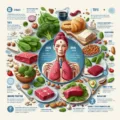Iron is an essential mineral that plays a crucial role in various bodily functions, including oxygen transport, energy production, and immune system support. However, many people struggle with iron deficiency and its related health issues. Understanding how to optimize iron absorption can make a significant difference in your overall health. In this article, we will explore various tips and tricks to enhance your body’s ability to absorb iron effectively.
Understanding Iron Types: Heme vs. Non-Heme Iron
Iron comes in two primary forms: heme and non-heme iron. Heme iron, found in animal products like red meat, poultry, and fish, is more easily absorbed by the body. Non-heme iron, found in plant-based foods like beans, lentils, and spinach, is less readily absorbed. Knowing the difference between these two types of iron can help you make dietary choices that maximize your iron intake.
Pair Iron-Rich Foods with Vitamin C
Vitamin C enhances the absorption of non-heme iron from plant-based foods. When you consume foods high in non-heme iron, pair them with vitamin C-rich foods such as citrus fruits, tomatoes, bell peppers, and broccoli. This combination can significantly boost your body’s ability to absorb iron.
Avoid Consuming Iron Inhibitors
Certain foods and beverages can inhibit iron absorption. These include coffee, tea, dairy products, and foods high in calcium. To optimize iron absorption, try to avoid consuming these inhibitors around the same time as your iron-rich meals. Instead, enjoy these items separately to ensure they do not interfere with your iron intake.
Cook with Cast Iron Cookware
Cooking with cast iron cookware can increase the iron content of your food. When you cook acidic foods, such as tomatoes or citrus-based dishes, in cast iron pots and pans, small amounts of iron leach into the food, boosting its iron content. This simple tip can help you naturally enhance your iron intake without making significant dietary changes.
Consider Iron Supplements
If you struggle to meet your iron needs through diet alone, iron supplements may be a beneficial option. Consult with your healthcare provider before starting any supplement regimen to determine the appropriate dosage and type of iron supplement for your specific needs. Keep in mind that excessive iron intake can be harmful, so it is essential to follow professional guidance.
Monitor Your Iron Levels Regularly
Regular monitoring of your iron levels through blood tests can help you stay on top of your iron status and make necessary dietary adjustments. If you have a history of iron deficiency or are at risk, work closely with your healthcare provider to develop a personalized plan for maintaining optimal iron levels.
FAQ
What are the symptoms of iron deficiency?
Common symptoms of iron deficiency include fatigue, weakness, pale skin, shortness of breath, dizziness, and brittle nails. If you experience these symptoms, consult with your healthcare provider for a proper diagnosis and treatment plan.
Can you get too much iron from food?
It is unlikely to get too much iron from food alone, especially if you consume a balanced diet. However, excessive iron intake from supplements can be harmful and lead to conditions like iron overload or hemochromatosis. Always follow medical advice when taking iron supplements.
Are there any specific groups at higher risk for iron deficiency?
Yes, certain groups are at higher risk for iron deficiency, including pregnant women, young children, women with heavy menstrual periods, vegetarians, and people with certain medical conditions like celiac disease or gastrointestinal disorders.
How long does it take to correct iron deficiency?
The time it takes to correct iron deficiency varies depending on the severity of the deficiency and the treatment approach. With proper dietary changes and/or supplementation, most people start to see improvements within a few weeks to a few months.
Can I improve iron absorption without taking supplements?
Yes, you can improve iron absorption through dietary choices and lifestyle changes. Focus on consuming iron-rich foods, pairing them with vitamin C, avoiding iron inhibitors, and using cast iron cookware to naturally boost your iron intake.









